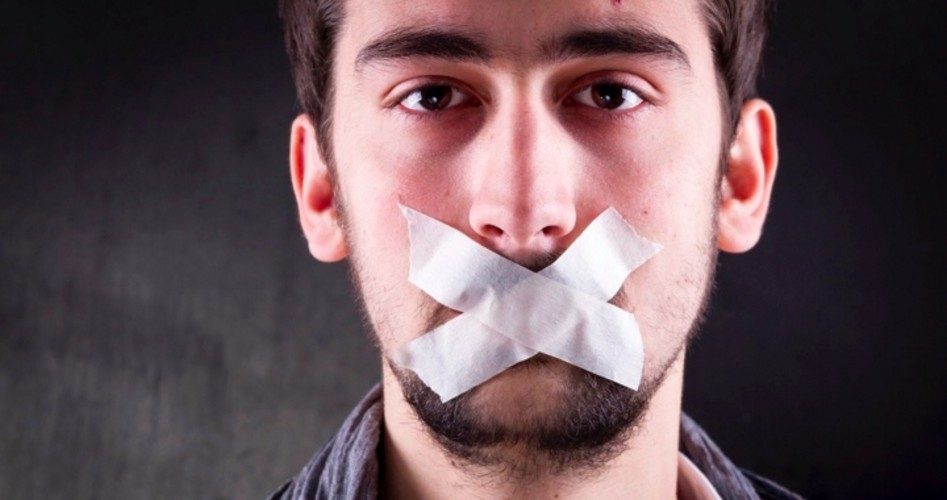
The resignation of University of Missouri President Tim Wolfe on Monday has apparently not ended the hunt for “hurtful speech” on the campus in Columbia..
The campus police sent an e-mail today to students at the university asking them to report other members of the college community who could be engaged in any “incidents of hateful and/or hurtful speech.” The e-mail admitted that “cases of hateful or hurtful speech are not crimes,” but “if the individual[s] identified are students, MU’s Office of Student Conduct can take disciplinary action.”
Campus protests escalated over the weekend, demanding the ouster of President Wolfe, charging that he had not done enough to address some alleged racial incidents at the university. Chancellor R. Bowen Loftin has also lost his job as a result of the demonstrations.
Among the racial incidents cited were these: a driver in a pickup truck yelling racial slurs at the president of the student government (who is black); another person driving though campus waving a Confederate flag; and an intoxicated white male student making racist remarks about members of a black student organization. Recently, a swastika, drawn in feces, was found in a dormitory bathroom.
These incidents led graduate student Jonathan Butler to stage a hunger strike last week, demanding the removal of the school’s president. A group calling itself Concerned Student 1950 (1950 being the year the first black students were admitted to the school) led the protests until Butler joined them. Finally, several members of the football team announced that they would not practice or play until Wolfe was gone.
In a tweet from those identified as “athletes of color,” Wolfe was charged with “negligence” for failure to halt the racist incidents. Exactly what the university president was supposed to have done was not clear, but his demise is apparently not the end of turmoil on the campus.
Campus police said the purpose of their e-mail to students was “to continue to ensure that the University of Missouri campus remains safe.” Students were asked to “call the police immediately” if they witnessed “hateful and/or hurtful speech.” Suggested ways to nab any potential malefactor were to write down the perpetrator’s license plate and to take photographs of “the individual with your cellphone.”
Since any such “hurtful and/or hateful speech” is not a crime in Missouri, any disciplinary action would be taken in accordance with violations of the university’s conduct code. Among the possible punishments listed in the student handbook are a written notice, loss of privileges, expulsion for the residence hall, and even ouster from the university.
If, under the incorporation doctrine of the 14th Amendment, it is held that government at any level cannot constitutionally infringe upon free speech, one must ask if the University of Missouri’s police department is in violation of the First Amendment of the U.S. Constitution. After all, the University of Missouri is an institution created and funded by the state of Missouri. If students in public schools do not give up their constitutionally protected rights when they go through “the school house door,” as the U.S. Supreme Court held in the Tinker case — when students wore black arm bands to protest the Vietnam War, and were punished by school authorities — is the University of Missouri campus police department saying that college students have less right to free speech than high school students?
Universities — once seen as bastions of free speech — have in many cases become institutions of authoritarianism. A recent poll by McLaughlin & Associates, sponsored by Yale University’s William F. Buckley, Jr.’s Program, revealed that the free exchange of ideas is not a highly valued commodity on the modern U.S. college campus. The poll queried 800 undergraduates across the country, with the startling revelation that 72 percent of respondents agreed with the statement, “Any student or faculty member on campus who uses language that is considered racist, sexist, homophobic or otherwise offensive should be subject to disciplinary action.”
One must ask: Who will make these judgments as to what is racist, sexist, homophobic, or otherwise offensive? After all, some consider any criticism of President Obama to be “racist.” Others castigate the Roman Catholic Church as sexist for its doctrinal position of not ordaining women to the priesthood. A Christian student or faculty member who believes the Bible is the Word of God will be labeled homophobic by many. The very existence of conservative political, economic, or social views is regarded as offensive by the American Left.
And how much more vague can an accusation be than “otherwise offensive”?
A recent article in The Austrian, published by the Mises Institute, charged that academia “is the greatest offender” in the push for the criminalization of certain types of speech. “Universities exist to pursue truth, not advance a political agenda. But the modern college student is forced to navigate a system designed to make him duller, poorer, and filled with bad ideas.”
What could be the next target of a college football team? A campus professor who expresses “offensive” ideas such as free enterprise, or believes that Western civilization is a good thing? Or even a professor who is a tough grader? If a mediocre 4-5 Missouri team has this much clout, what could a national power squad such as Notre Dame, Alabama, or Oklahoma get done?
This radicalism is already spreading, and will almost certainly infect campuses from coast to coast. A lecturer at Yale has fallen under attack this year for dismissing concerns over supposedly offensive Halloween costumes by asserting, “If you don’t like a costume someone is wearing, look away, or tell them you are offended.” These remarks have even led to protests at the Ivy League school.
It appears that George Orwell’s dystopian novel 1984, in which the all-powerful Big Brother government punishes “thought crime,” is finally coming true at the University of Missouri and other college campuses.



